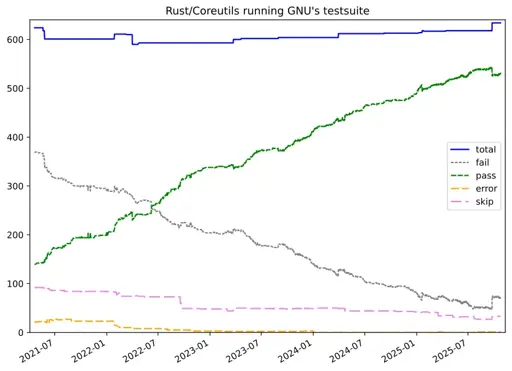The uutils project announced tonight the release of Rust Coreutils 0.3, another step forward for this Rust version alternative to GNU Coreutils that has been attracting a lot of interest lately due to Ubuntu 25.10 now using it by default.
Rust Coreutils 0.3 brings improved GNU test suite compatibility with now passing 532 tests, or nearly an 84% pass rate. There is improved error handling and other updates to better match the behavior of GNU Coreutils… Such as the recently noted date issue breaking Ubuntu 25.10’s unattended upgrades.



I feel despair every time this project comes up ): I really like the idea of rewriting coreutils in rust, but GNU-compatible coreutils in a permissive license is just asking for trouble…
Everytime this comes up I have to remind everyone that many of the beloved “base programs” for Linux systems are MIT and nobody is going crazy over them. Xorg, Wayland, Neovim, Zsh, htop, curl…
I’m curious, what’s the worst case scenario in your eyes? I struggle to see why anyone would closed-fork it, or what threat it would pose if they did.
A rust rewrite of these tools has a lot of potential commercial value, and I can totally see a cloud provider like AWS putting this into some “hardened cloud AI distro” or whatever. They’ll be able to do exactly what they did to Elastic Search, or do the EEE thing and add bugfixes/features that they don’t contribute back in order to make their offering more competitive, make minor changes to the CLI as a lock-in strategy, etc.
Not licensing this as GPL will inevitably lead to the erosion of freedoms for everyone.
I will take that bet.
There are already other core utils to choose from. The BSD utils are arguably better than the GNU ones for the use case you mentioned (and permissively licensed obviously). Has anybody “forked” the BSD utils and “taken them proprietary”?
I mean, people can use the code but that does not take away freedom from anybody (at least not in my view).
I am quite happy to go on record and disagree with your prediction. Time will tell.
You didn’t get my point. AWS is incentivized to offer the best product they can sell to their customers, regardless of license. If the Rust core utils reach feature parity with GNU core utils, then Rust’s memory safety makes it the superior product (at least on security) and an easy sell to customers.
That is the point at which the license choice matters for what I said: when it’s widely adopted by AWS customers. If it isn’t GPL, then AWS is free to do what I described, and incentivized to do so.
Sure, if AWS customers widely adopted the BSD tools for whatever reason, then it’d be the same situation. I just don’t see any particular reason for that to happen.
Every time this comes up, I see people complaining about the license, and I have an urge every time to start a project anew, or to find yet another project which re-writes coreutils in Rust but licensed with GPLv3.
Today I finally gathered enough urge to… do a search in Kagi. No. There is no such project.
Shall we start one? Even with just a stub it’ll be a start. Anyone?
Well, MIT projects can be forked into a new GPLv3 project, right? If Canonical cared, they could have done that to assuage this concern.
I think it’s a valid concern. Pushover licenses are bad. But even if a GPL Rust coreutils project exists (I actually have one, but I don’t have the same goals), it seems unlikely that Canonical would be bothered to pivot to it.